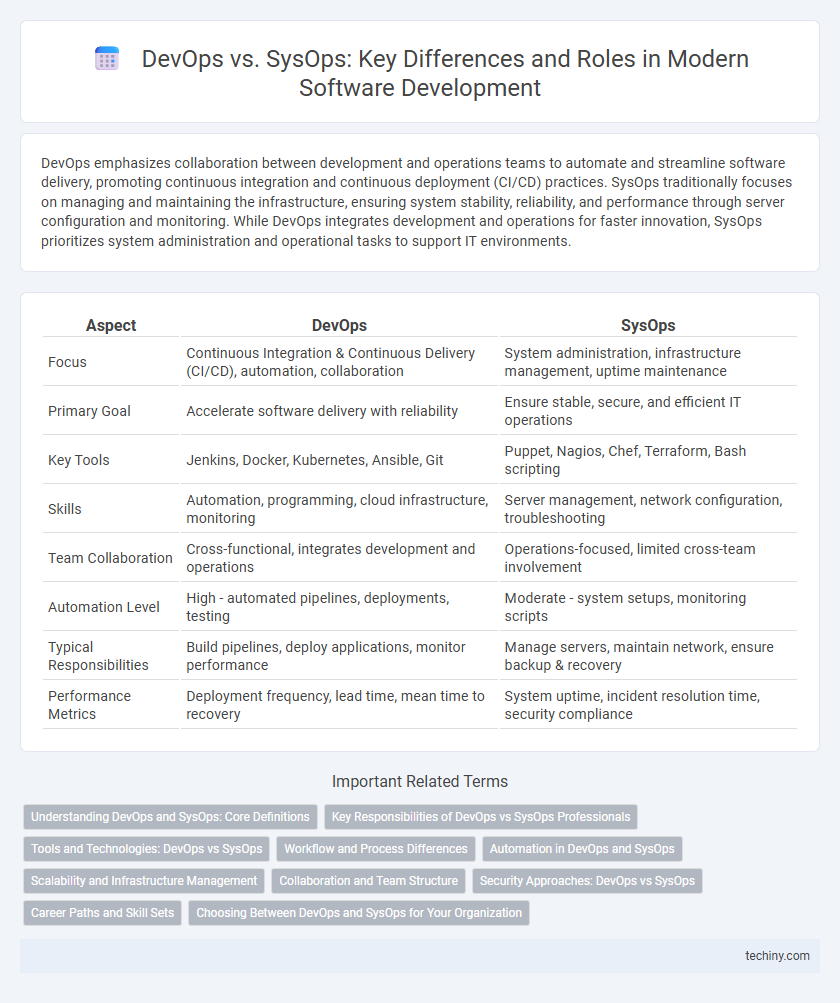DevOps emphasizes collaboration between development and operations teams to automate and streamline software delivery, promoting continuous integration and continuous deployment (CI/CD) practices. SysOps traditionally focuses on managing and maintaining the infrastructure, ensuring system stability, reliability, and performance through server configuration and monitoring. While DevOps integrates development and operations for faster innovation, SysOps prioritizes system administration and operational tasks to support IT environments.
Table of Comparison
| Aspect | DevOps | SysOps |
|---|---|---|
| Focus | Continuous Integration & Continuous Delivery (CI/CD), automation, collaboration | System administration, infrastructure management, uptime maintenance |
| Primary Goal | Accelerate software delivery with reliability | Ensure stable, secure, and efficient IT operations |
| Key Tools | Jenkins, Docker, Kubernetes, Ansible, Git | Puppet, Nagios, Chef, Terraform, Bash scripting |
| Skills | Automation, programming, cloud infrastructure, monitoring | Server management, network configuration, troubleshooting |
| Team Collaboration | Cross-functional, integrates development and operations | Operations-focused, limited cross-team involvement |
| Automation Level | High - automated pipelines, deployments, testing | Moderate - system setups, monitoring scripts |
| Typical Responsibilities | Build pipelines, deploy applications, monitor performance | Manage servers, maintain network, ensure backup & recovery |
| Performance Metrics | Deployment frequency, lead time, mean time to recovery | System uptime, incident resolution time, security compliance |
Understanding DevOps and SysOps: Core Definitions
DevOps integrates software development and IT operations to shorten the development lifecycle while delivering features, fixes, and updates frequently in close alignment with business objectives. SysOps focuses on managing and maintaining IT infrastructure, ensuring system reliability, availability, and performance through routine administration and monitoring tasks. Understanding these core definitions highlights DevOps as a collaborative framework for continuous integration and delivery, whereas SysOps centers on stable system administration and operational support.
Key Responsibilities of DevOps vs SysOps Professionals
DevOps professionals focus on continuous integration, continuous delivery (CI/CD), and automation to streamline software development and deployment processes. SysOps professionals manage and maintain IT infrastructure, including servers, networks, and system performance monitoring to ensure operational stability. While DevOps emphasizes collaboration between development and operations for faster releases, SysOps specializes in system administration and infrastructure reliability.
Tools and Technologies: DevOps vs SysOps
DevOps leverages continuous integration and continuous delivery (CI/CD) tools like Jenkins, GitLab CI, and CircleCI to automate the software release pipeline, while SysOps primarily uses configuration management tools such as Ansible, Puppet, and Chef to maintain infrastructure stability. Containerization technologies like Docker and orchestration platforms like Kubernetes are central to DevOps for scalable deployments, whereas SysOps emphasizes traditional monitoring tools like Nagios and Zabbix for managing server health. Cloud platforms including AWS, Azure, and Google Cloud support both roles but are integrated differently to optimize development workflows in DevOps versus operational reliability in SysOps.
Workflow and Process Differences
DevOps integrates development and operations teams to automate the software delivery pipeline, emphasizing continuous integration, continuous deployment (CI/CD), and collaboration throughout the entire application lifecycle. SysOps focuses on system administration and infrastructure management, prioritizing stability and maintenance through manual or scripted configurations and monitoring of servers, networks, and hardware. The DevOps workflow promotes agile methodologies and rapid innovation, while SysOps relies on predefined processes for system configuration, incident response, and uptime assurance.
Automation in DevOps and SysOps
DevOps leverages automation to streamline continuous integration, continuous delivery (CI/CD), and infrastructure provisioning, enabling faster deployment cycles and greater collaboration between development and operations teams. SysOps focuses automation primarily on system administration tasks such as server configuration, monitoring, and incident response to ensure stable and reliable IT infrastructure. The extensive use of automation scripts and tools like Ansible, Puppet, and Jenkins in DevOps significantly reduces manual intervention compared to traditional SysOps processes.
Scalability and Infrastructure Management
DevOps emphasizes automation and continuous integration to enhance scalability by streamlining infrastructure management through Infrastructure as Code (IaC) and container orchestration tools like Kubernetes. SysOps focuses on maintaining and monitoring existing infrastructure, ensuring system stability and performance through manual configuration and reactive troubleshooting. The scalability advantage in DevOps lies in proactive management and rapid deployment, while SysOps prioritizes consistent uptime and operational reliability.
Collaboration and Team Structure
DevOps emphasizes a collaborative culture that merges development and operations teams, fostering continuous integration and continuous delivery (CI/CD) for faster software releases. SysOps typically operates within a more traditional, siloed structure focused on system administration and infrastructure stability. The DevOps model enhances communication and shared responsibilities, driving agility and innovation within cross-functional teams.
Security Approaches: DevOps vs SysOps
DevOps integrates security practices within the development lifecycle through DevSecOps, emphasizing automated security testing, continuous monitoring, and rapid vulnerability response to ensure secure code delivery. SysOps centers security on infrastructure stability and compliance, implementing strict access controls, system hardening, and regular patch management to maintain operational security. Both approaches prioritize security but differ in scope, with DevOps focusing on application-level security and SysOps targeting system and network-level protections.
Career Paths and Skill Sets
DevOps professionals specialize in automating software development and deployment processes, requiring strong skills in CI/CD pipelines, cloud platforms like AWS or Azure, and collaboration tools such as Jenkins and Docker. SysOps experts focus on maintaining and managing IT infrastructure, emphasizing system administration, network management, and monitoring tools like Nagios and Ansible. Career paths for DevOps tend to lead toward software engineering and cloud architecture, while SysOps roles often evolve into system administration or IT operations management.
Choosing Between DevOps and SysOps for Your Organization
Choosing between DevOps and SysOps depends on your organization's goals for software delivery speed and system reliability. DevOps emphasizes automation, continuous integration, and collaboration between development and operations teams to accelerate deployment cycles. SysOps focuses on maintaining and optimizing existing infrastructure and system stability, making it ideal for organizations prioritizing reliable IT operations and system administration.
DevOps vs SysOps Infographic

 techiny.com
techiny.com